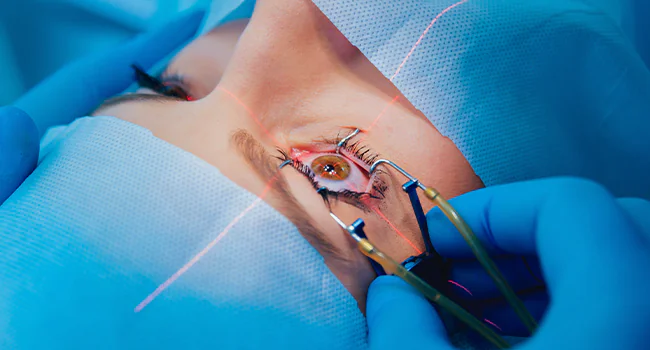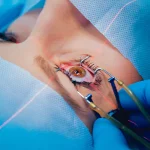LASIK (short form for Laser-Assisted in Situ Keratomileusis) surgery is the most common type of permanent surgical procedure undertaken by eye specialists for correcting vision problems. Even though a Lasik surgery can treat various kinds of refractive errors like nearsightedness, farsightedness, and astigmatism, it cannot treat presbyopia, which is an ocular disease that occurs after people cross the age of 40 years. Currently, many people have undergone Lasik surgery and eliminated the usage of contact lenses or eyeglasses.
With this blog’s help, we hope to educate you on all the information about Lasik surgery. Still, before we launch into the rest of the discussion, it’s important to determine and decide on people who are a perfect fit for this procedure. However, with that being said, we are happy to inform you that most of the people are suitable candidates for successful Lasik surgery.
People unsuitable for Lasik Surgery.
A few circumstances under which some people might not be suitable for undergoing a Lasik surgery include people who are already suffering from pre-existing, long-standing diseases like cataracts, dry eyes, or some form of corneal diseases.
In addition to people suffering from diseases like mentioned above, people suffering from a compromised visual acuity or facing temporary ocular disorders are not advised to undergo Lasik surgery.
Finding an expert Lasik surgeon
When it comes to vision and health of eyes, people don’t want to settle for a doctor who cannot perform as per the latest medical standards. Luckily, many eye specialists can perform Lasik surgery with absolutely zero complications. Also, Lasik is known to have a high success rate. Now that’s something to look forward to.
With that being said, here are some handy tips that can help people in finding the best possible eye surgeon for a Lasik surgery-
Look for an eye surgeon or an eye hospital that uses the most advanced and latest eye technologies for performing Lasik. As technologies and equipment change rapidly due to innovations, we advise people to ask their eye doctors about the kinds of equipment they will be using for successful Lasik surgery.
Another critical question that can help people choose the best Lasik surgery expert is determining if the doctor is a Lasik surgery specialist or not.
And last but not least. Ask your Lasik surgeon a lot of questions. You can never be too sure and safe. Take as much time as you want to be confident about your surgeon. Be sure about the in’s and out’s of Lasik surgery in its entirety.
How is Lasik Surgery performed?
Lasik Surgery is a non-invasive form of surgery, and patients are permitted to remain conscious throughout the surgery. Generally, the surgery is 100% painless and has no postoperative difficulties associated with it. Here is a brief overview of the successive steps involved during a LASIK surgery:
Step 1: The doctor gives a local anaesthetic in the form of a liquid eye drop to sufficiently numb the eye tissue.
Step 2: Then, a medical instrument known as a speculum is placed on the eyes to keep them open and free from blinking.
Step 3: A suction ring is placed on the cornea, which helps apply pressure and allow eye doctors to perform a pain-free cutting of the cornea and the surrounding tissues.
Step 4: After placing the suction-ring, the eye surgeon carefully cuts a small flap in the cornea.
Step 5: After cutting the corneal flap, it is gently folded outwards to make way for the surgical laser correction.
Step 6: Lastly, the doctor uses a laser to gently and painlessly reshape the cornea and correct eye ailments like myopia, hyperopia, and astigmatism.
Step 7: Once the Lasik surgery has been performed, the doctor folds the corneal flaps, and the procedure is finished.
Note that LASIK surgery is typically performed separately with each eye only taking around 15 to 20 minutes.
Recovery Process
Doctors advise using protective eyewear for protecting the eyes from natural sunlight or dust and debris. It is important to avoid rubbing or scratching the eyes after the surgery. It is also advisable to avoid any physical and strenuous activity. That being said, feel free to contact an eye doctor in case of any issues as he will most likely be willing to prescribe a mild pain-killer along with certain antibiotic drops to aid in the healing process.
In Summary
LASIK eye surgery is a very safe medical procedure that can make a difference in your visual acuity and visual comfort. Wouldn’t it be great to see the beauty of this world without those pesky glasses or lenses? We at Centre for Sight understand that deciding whether or not to have LASIK eye surgery is a major consideration. For many, it may feel like a major life undertaking.
We hope that after reading the above-written blog, our readers can feel more confident about making a definitive decision regarding the health and optimal functioning of their eyes. If you still have any questions about Lasik surgery, get in touch with our experts now.
Article: Understanding Lasik Surgery: Before and After | Centre For Sight
Author: CFS Editorial Team | Sept 21 2020 | UPDATED 02:00 IST
*The views expressed here are solely those of the author in his private capacity and do not in any way represent the views of Centre for Sight.





